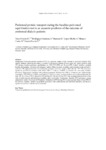Peritoneal protein transport during the baseline peritoneal equilibration test is an accurate predictor of the outcome of peritoneal dialysis patients

View/
Use this link to cite
http://hdl.handle.net/2183/19197Collections
- Investigación (FCS) [1293]
Metadata
Show full item recordTitle
Peritoneal protein transport during the baseline peritoneal equilibration test is an accurate predictor of the outcome of peritoneal dialysis patientsAuthor(s)
Date
2010Citation
Pérez-Fontán M, Rodríguez-Carmona A, Barreda D. López-Muñiz A, Blanco-Castro N, García-Falcón T. Peritoneal protein transport during the baseline peritoneal equilibration test is an accurate predictor of the outcome of peritoneal dialysis patients. Nephron Clin Pract. 2010;116(2):104-113
Abstract
[Abstract] Background: Peritoneal protein excretion (PPE) is a potential marker of the outcome in peritoneal dialysis (PD) patients. Method: Observational study of a cohort of 269 patients starting PD in a single unit. Study variables: total PPE during a baseline peritoneal equilibration test (PET; PET-PPE) and 24-hour PPE. Control variables: essential baseline demographic, laboratory and adequacy markers. Main outcomes: mortality, cardiovascular events and risk of peritonitis. We applied univariate and multivariate strategies of survival analysis. Main Results: PET-PPE sustained a significant, yet limited correlation with 24-hour PPE (r = 0.46, p < 0.0005). At baseline, the main study variables showed an independent correlation with peritoneal transport characteristics (D/P240’ creatinine) and cardiovascular comorbidity. PET-PPE (p < 0.0005, model global χ2 59.4) was a more accurate predictor of overall mortality than 24-hour PPE (p = 0.04, χ2 50.5). Moreover, PPE during PET, but not 24-hour PPE, was an independent predictor of the risks of cardiovascular and infectious mortality, and of peritonitis. Conclusions: Baseline PPE represents a strong independent marker of survival of PD patients. Estimation of PPE during PET is more accurate than 24-hour PPE for this purpose, sustains a definite independent association with cardiovascular and infectious mortality, and shows a significant correlation with the risk of peritonitis.
Keywords
Peritoneal equilibration test
Protein transport
Cardiovascular diseases
Mortality
Peritonitis
Protein transport
Cardiovascular diseases
Mortality
Peritonitis
Editor version
ISSN
1660-2110
1660-8151
1660-8151
Related items
Showing items related by title, author, creator and subject.
-
Significado de la celularidad peritoneal basal: más allá del diagnóstico de infección peritoneal en diálisis peritoneal
García Gago, L.; Bravo González-Blas, L.; Otero Alonso, P.; López-Iglesias, Antía; García Enríquez, Alba; Rodríguez-Carmona, Ana; García Falcón, María Teresa; Pérez-Fontán, Miguel (Elsevier, 2018) -
Analysis of ultrafiltration failure diagnosed at the initiation of peritoneal dialysis with the help of peritoneal equilibration tests with complete drainage at sixty minutes: a longitudinal study
Machado Lopes, Daniela; García Falcón, María Teresa; Rodríguez Carmona, Ana; López-Muñiz, Andrés; Ferreiro-Hermida, Tamara; López-Iglesias, Antía; Pérez-Fontán, Miguel (SAGE, 2016-01-13)[Abstract] Background: Ultrafiltration failure (UFF) diagnosed at the initiation of peritoneal dialysis (PD) has been insufficiently characterized. In particular, few longitudinal studies have analyzed the time course of ... -
Persistent overhydration associates a significant risk of peritoneal infection with enteric germs in patients treated with peritoneal dialysis
Fiel, D. Carvalho; Pérez-Fontán, Miguel; López-Iglesias, Antía; Bravo González-Blas, L.; García Gago, L.; García Falcón, María Teresa; Rodríguez-Carmona, Ana (Elsevier, 2019-11)[Abstract] Background: Overhydration (OH) complicates frequently the clinical course of Peritoneal Dialysis (PD) patients, and keeps a controversial association with the risk of peritoneal infection. The main objective ...





